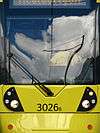West Didsbury tram stop
West Didsbury is a tram stop on the South Manchester Line (SML) of Greater Manchester's light-rail Metrolink system. It opened to passengers on 23 May 2013,[1][2] in West Didsbury, South Manchester, England.[3][4]
The Metrolink stop sits some 300m south east of the former heavy rail station of the Midland Railway, which opened 1 January 1880 as Withington; was renamed on 1 July 1884 to Withington and Albert Park; renamed again on 1 April 1915 to Withington and West Didsbury; and closed 3 July 1961. The route was earmarked for redevelopment with a light rail system during the 1980s, and was confirmed and funded as part of Metrolink's Phase 3b of expansion in 2006.
Service pattern
- 12 minute service to Deansgate-Castlefield with double trams in the peak
- 12 minute service to East Didsbury with double trams in the peak
History
Railway station
Withington & West Didsbury railway station opened in 1880 as "Withington" when the Midland Railway opened its new Manchester South District line out of Manchester Central Station. The station was renamed "Withington & Albert Park" in 1884, and then "Withington & West Didsbury" in 1895.[5][6]
The Manchester South District line, and consequently Withington & West Didsbury station, closed in July 1961. By the 2000s, the original cobbled station approach road and wall were still visible off Lapwing Lane, and the remains of the station platforms could still be seen at the bottom of the overgrown embankment.
Metrolink stop
The West Didsbury Metrolink stop opened on 23 May 2013, on the opposite side of Palatine Road from the original railway station.[1][2][7]
 Midland Railway lines out of Manchester, showing the Manchester South District line
Midland Railway lines out of Manchester, showing the Manchester South District line The disused Manchester South District line in Didsbury
The disused Manchester South District line in Didsbury West Didsbury
West Didsbury The first Metrolink passenger service to stop at West Didsbury, at 5.53 a.m. on 23 May 2013
The first Metrolink passenger service to stop at West Didsbury, at 5.53 a.m. on 23 May 2013
See also
References
- 1 2 3 "Early doors for East Didsbury's new Metrolink line". Transport for Greater Manchester. Retrieved 14 May 2013.
- 1 2 "First passengers travel on tram extension to East Didsbury". Manchester Evening News. 23 May 2013. Retrieved 23 May 2013.
- ↑ "Tram line extension is approved". BBC News. 13 May 2009. Retrieved 17 May 2009.
- ↑ "Metrolink: back on track?". BBC Manchester. 2009-05-13. Retrieved 17 May 2009.
- ↑ Sussex, Gay; Helm, Peter (1988). Looking Back at Withington and Didsbury. Timperley: Willow Publishing. p. 22. ISBN 0-946361-25-8.
- ↑ "Withington and West Didsbury". Disused Stations: Closed Railway Stations in the UK. Retrieved 2012-05-27.
- ↑ "Metrolink - South Manchester line". Transport for Greater Manchester. Retrieved 19 May 2013.
External links
| Wikimedia Commons has media related to West Didsbury tram stop. |
| Preceding station | Following station | |||
|---|---|---|---|---|
towards East Didsbury | East Didsbury – Victoria Line | towards Victoria |
||
towards East Didsbury | Shaw and Crompton – East Didsbury Line | towards Shaw and Crompton |
||
towards East Didsbury | East Didsbury – Deansgate-Castlefield Line | towards Deansgate-Castlefield |
||
| Disused railways | ||||
| Chorlton-cum-Hardy Line closed, station open |
Midland Railway South District Railway |
Didsbury Line and station closed | ||


